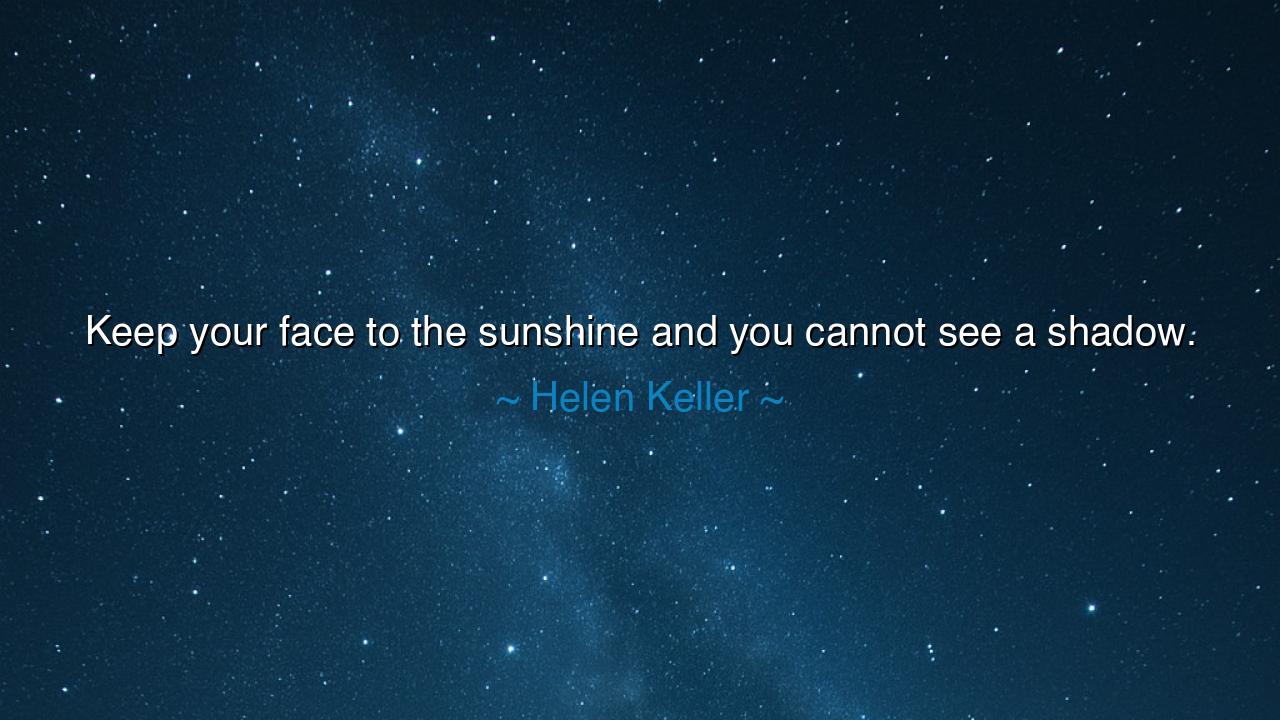
Keep your face to the sunshine and you cannot see a shadow.






Hear, O seekers of truth, the words of Helen Keller, who once declared: “Keep your face to the sunshine and you cannot see a shadow.” These are not idle musings, but the wisdom of a soul who knew darkness more than most, yet chose to live in light. For Keller, blind and deaf from childhood, could not see the literal sunshine, yet she felt its warmth and knew its power. From her lips flows a teaching as old as the dawn: what the spirit gazes upon, it becomes. If you choose to face the light, the shadows shall fade from your sight.
This saying is both gentle and mighty, like water that carves the stone. To “keep your face to the sunshine” is to set your heart upon hope, to turn toward faith when despair calls, and to seek goodness even when darkness presses heavily upon the soul. The shadow is not denied—it exists, it follows, it lingers—but it cannot govern the one who has chosen to walk in the direction of light. The truth is not that suffering ceases, but that perspective transforms. Where the eyes rest, there the spirit abides.
The ancients knew this well. Consider the story of Victor Frankl, a man imprisoned in the death camps of the Second World War. Surrounded by cruelty, hunger, and despair, he yet wrote of finding meaning in suffering. Though the shadows of death and evil loomed all around, he turned his gaze inward toward the sunshine of purpose. He chose to believe that even in suffering there was value, that even in loss, the human spirit could rise. And because he faced the light of meaning, the shadows could not conquer him. His life became testimony that even in the darkest place, light may still be found.
Thus the teaching of Keller is heroic: it is not simply the counsel of comfort, but the battle cry of one who would not bow to despair. To face the sunshine is to take command of the mind, to deny the shadows the power to consume. This is no easy task, for the eyes are often tempted by gloom, the heart is often weighed by fear. Yet the warrior of spirit knows that the direction of the gaze determines the destiny of the soul.
Hear then the lesson: life will bring its share of darkness. Friends may betray, fortunes may crumble, bodies may weaken. But the shadow is only the absence of light—it has no substance of its own. If you turn your face, if you direct your thoughts, your prayers, your courage toward the sunshine of hope, gratitude, and faith, then the shadow falls behind you. It follows, but it does not rule.
What then must you do? Each morning, rise and set your face toward one bright thing. Speak words of gratitude, however small. When trials come, do not feed the shadow with endless complaint, but search for the lesson hidden in the pain. When your spirit falters, walk into the sunshine of noble company, those who uplift and inspire. And when despair whispers in your ear, answer it not with surrender, but with action—take even the smallest step forward, and the shadow will recede.
In this way, the words of Helen Keller become not only a proverb but a guiding star. She who lived in darkness tells us how to live in light. *“Keep your face to the sunshine and you cannot see a *shadow.” This is the way of resilience, the path of hope, the secret of triumph. Let your face be ever lifted, let your spirit ever lean toward the light, and though shadows may trail behind, they will never overcome you.






DTDuong Thuy
This perspective makes me reflect on the interplay between attention and perception. By focusing on light, do we literally and metaphorically diminish the influence of negativity? I also consider whether shadows are necessary for contrast, highlighting the brilliance of the sunshine. How can this metaphor guide daily life, helping us to cultivate awareness, optimism, and resilience while navigating inevitable challenges?
NVNam Vu
I find this quote comforting, but it makes me question balance. Is it possible to stay focused on positivity without neglecting responsibilities or practical challenges? I also wonder whether the ‘sunshine’ can be internal, such as gratitude, mindfulness, or self-love, rather than external circumstances. Finally, how might this approach influence leadership, mentorship, or teaching, by encouraging others to focus on solutions and hope rather than obstacles?
HHQuynh Huong Ho
This statement sparks curiosity about resilience and focus. Could maintaining attention on the positive aspects of life genuinely influence behavior and emotional health? I also ponder whether Keller’s message applies differently depending on context—personal struggles, societal challenges, or creative endeavors. How might this principle encourage proactive action, self-compassion, and long-term growth rather than passive optimism?
NHKhanh Nguyen Hoang
I appreciate the metaphorical beauty of this statement, yet it raises practical questions. Does actively seeking the sunshine require daily effort and mindfulness, or can it become natural over time? I also wonder how cultural, social, or personal experiences shape our perception of light and shadow. Could adopting this mindset transform relationships, work environments, or personal well-being, even in difficult circumstances?
THle thi huong
Reading this, I feel inspired, yet curious about the psychological implications. Can deliberately focusing on the positive reduce stress, anxiety, or negative thinking? I also question whether avoiding the ‘shadow’ entirely might prevent us from fully processing emotions like grief, disappointment, or fear. How do we cultivate the ability to embrace optimism while still acknowledging the lessons or warnings that shadows may represent?